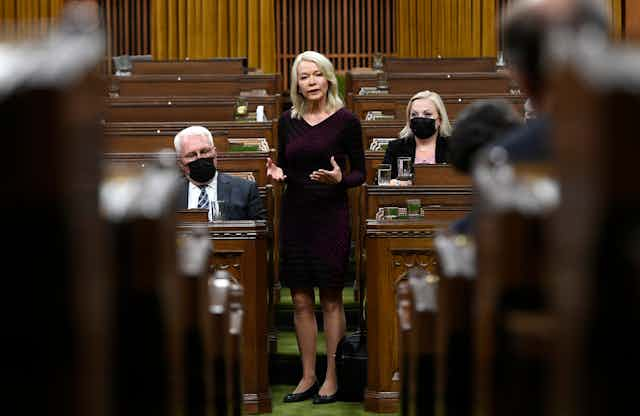Prior to becoming interim leader of the Conservative Party of Canada, MP Candice Bergen was among the more vocal members of caucus to push former leader Erin O’Toole into an explicit embrace of the so-called freedom convoy that’s now occupying Ottawa.
CTV quoted Bergen echoing, almost verbatim, former U.S. president Donald Trump’s description of the 2017 Unite the Right Rally in Charlottesville, Va., which ended violently, as having “good people on both sides.”
The problem is that in both cases, this is untrue. There aren’t two sides or shades of grey when a protest is associated with symbols of white supremacy, the desecration of national monuments, the staging of a mock Indigenous drum circle and accounts of verbal intimidation and abuse of regular citizens.
There are also no shades of grey when one side embraces public health to protect the most vulnerable and the other side, through their own actions, endangers public health by flouting public health regulations and spreading misinformation about COVID-19 vaccines.
Far-right authoritarian populism of the type associated with events like Charlottesville and the Jan. 6, 2021 attack on the U.S. Capitol has admirers in Canada. Plainly. Some of the truckers fly Trump flags and Bergen has been photographed wearing a MAGA hat. Canada is not exactly America’s moderate little cousin to the north.
Events like the so-called freedom convoy don’t just harm communities and individuals, they do serious damage to the body politic. We are all injured by the spread of misinformation about public health matters like COVID-19 or issues like catastrophic climate change caused by carbon consumption. But we’re also injured by false and destructive narratives about the Constitution and the rule of law.
‘Lacking in merit’
As a professor of jurisprudence and the rule of law, I predict violations alleged by the freedom convoy protesters will be found deeply lacking in merit once the dust has settled and the various Charter claims have wound their way through the courts.
Even fairly restrictive COVID-19 health protocols are unlikely to breach someone’s Charter rights in a way that entitles them to a court-ordered remedy. That’s because all individual rights and liberties in the Charter are subject to a proportionate balancing against the broader public good — none more obvious than scientific and data-driven assessments of risks posed by a virus that’s killed almost six million people worldwide, including more than 34,000 Canadians, in two years.
In fact, the very first provision in the Constitution of Canada is Sec. 1 of the Charter explicitly stating:
“The Canadian Charter of Rights and Freedoms guarantees the rights and freedoms set out in it subject only to such reasonable limits prescribed by law as can be demonstrably justified in a free and democratic society.”
Charter challenges to pandemic-related public health protocols enacted by both the federal and provincial governments are slowly being decided. They show very little promise for those asserting Charter rights violations due to COVID-19 health protocols. In most cases, Sec. 1 will stop any claim in its tracks.
So while Canada’s Constitution will not permit the RCMP to smash down the door of vaccine holdouts and violate their bodily integrity by forcing them to get the jab, it permits the weighing of individual rights to freedom of religion and conscience against the risk of worsening a public health crisis and creating an even greater loss of life.
So far, however, the truckers have not even explicitly stated which of their particular Charter rights they believe are being violated and how.
Blaming the wrong person
The federal government’s requirement that truckers crossing the Canada-U.S. border must be vaccinated is aligned with the same requirement by American authorities.
But beyond the fundamental weakness of any Charter objection to vaccine mandates for cross-border truckers lies an even broader weakness to the truckers’ rallying cry: “Fuck Trudeau.”

He is not to blame.
Beyond the border, the federal government doesn’t have jurisdiction over much of what the protesters are objecting to.
The provinces are on the front lines of the response to COVID-19 in terms of the management of health care, the regulation of private businesses and most other aspects that play a major role in how the pandemic is affecting day-to-day life for Canadian citizens. That’s how federalism works.
Trudeau, the focus of the truckers’ ire, has become a puzzling far-right obsession similar to how Barack Obama and Hillary Clinton became the focus of wild-eyed conspiracy mongers south of the border. The fixation on Trudeau personally is a symptom of extremism. It is reactionary and irrational in the extreme.
Trump-admiring Conservatives
Now that the Conservatives have traded O'Toole for Bergen and firebrand Pierre Poilievre is waiting in the wings, American-style, Trump-admiring Conservatives are poised to take over the Official Opposition here in Canada. Canadians should be alarmed.
Trouble is, there are no both sides when one side cannot abide scientific facts or make a cognizable legal argument. The truckers in Ottawa and their supporters are not good-faith activists or empowered citizens.
They have not done their research. They don’t understand the Charter, federalism or the rule of law. They are selfish and entitled because they understand freedom in a purely individualistic sense. The convoy, like the escalating blockade on the Canadian side of the U.S. border in Coutts, Alta., is a sign that Canada is on the cusp of its own Charlottesville or Jan. 6.
We are fools to think ourselves immune.

